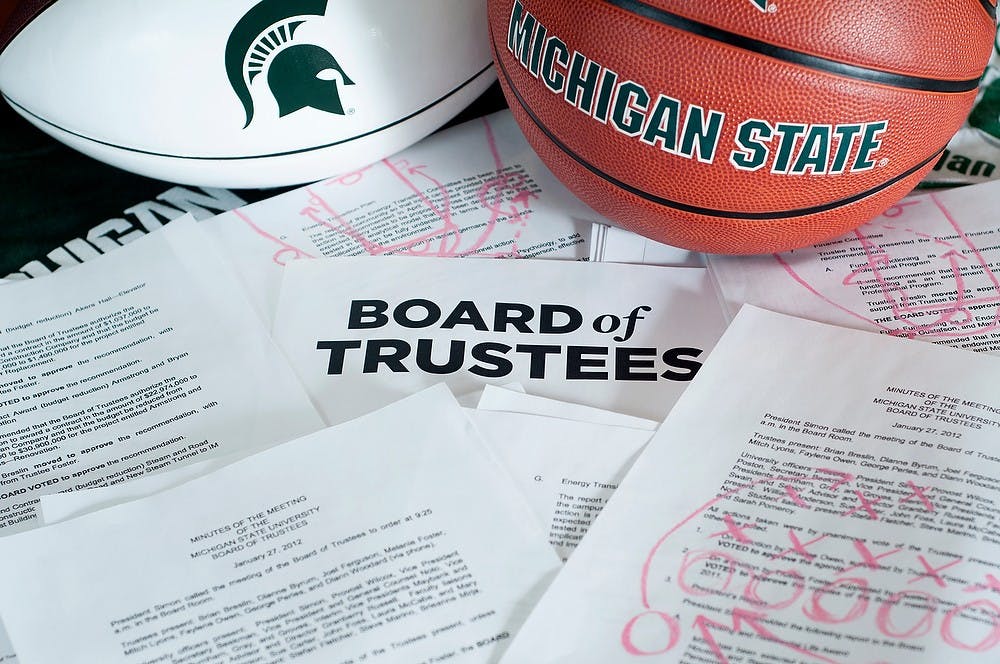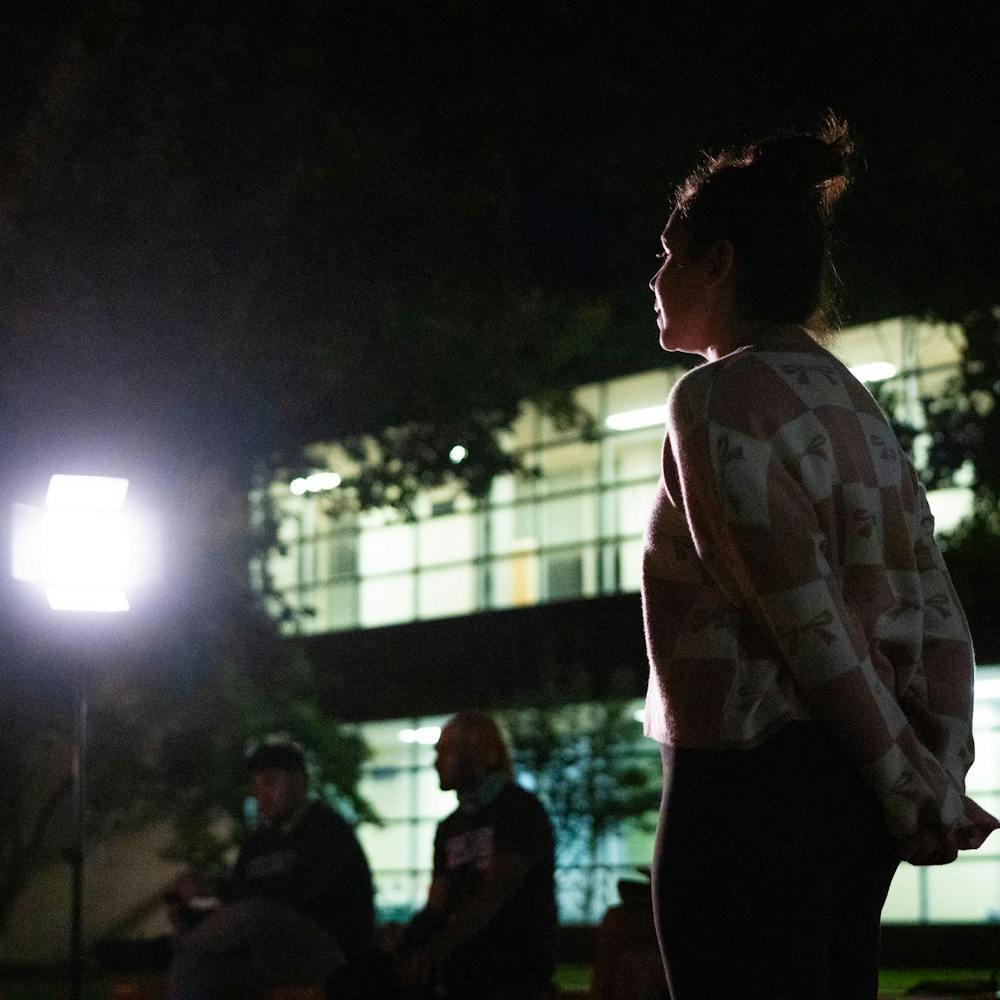In 2013, the MSU Board of Trustees will add another MSU ex-athlete to its roster. As a result of the November elections, former football co-captain Brian Mosallam was elected as the newest member of the university’s governing board — meaning half of the board’s eight seats will be filled with former MSU student-athletes.
With this ratio, many, including a few trustees, have recognized why some might be speculative about the board’s athletic decisions, fearing board members might have a conflict of interest.
But George Perles, MSU’s last Rose Bowl-winning football coach, believes it is a “nonissue,” and many others agree all decisions are made on behalf of the university’s best interests.
Joel Ferguson, the board’s chairman, and Mosallam agreed the fact that half of MSU’s trustees are former athletes is proof the university produces successful student-athletes.
“I think it says a lot about MSU that we can graduate athletes (who) can aspire to lofty goals,” Mosallam said. “It’ll only help MSU and the board in terms of continuity.”
After beating out the board’s current vice chairperson Melanie Foster in this year’s statewide election, Mosallam will join Perles, former football standout Mitch Lyons and ex-Spartan basketball player Brian Breslin on the board.
The board will feature four former athletes or coaches on the eight-person panel that decides on important issues, such as tuition, construction projects and policymaking when Mosallam’s new position becomes effective Jan. 1, 2013.
Although some might see the ratio to favor athletic proposals, MSU trustees and officials agreed decisions made by the board always are made in the best interest of the university’s students.
Risky business
Nancy Wonch, a professor at Thomas M. Cooley Law School, also said she doesn’t believe there will be favoritism or conflict of interest in the board’s decision-making, although she said it’s tough to tell.
“Conflicts of interest always depend on the individual,” Wonch said. “People come into boards with all kinds of history, (and) athletics is just one (part).”
No-preference freshman Daniel Davenport said he sees athletics as a large part of MSU and that he can see a potential bias.
“I think they (might) vote more in favor of athletics,” Davenport said. “But it’s not a huge impact on the university.”
To Lyons, it’s not a surprise this question has risen amongst some.
But he said each member of the board keeps his or her own interests at bay and does what is right in the grand scheme of things.
“If we don’t think it’s in the best interest of the university, we are (certainly) humble enough not to make decisions on what we would like to see personally,” Lyons said.
In recent years, the board approved new football scoreboards and an expansion at Spartan Stadium, totaling about $28 million in costs, with some fundraising activities to help cover the price tags.
Ferguson said athletic decisions are a very small part of the many projects the board considers, such as a $55 million project as a part of the Facility for Rare Isotope Beams, or FRIB, and other multimillion dollar projects, such as road constructions, dining hall upgrades and a new Multicultural Center.
The athletics department is an independent entity, and the board only will ratify what is proposed by athletics director Mark Hollis, he said.
But Ferguson said the scoreboard is paying for itself because companies can advertise on the big screen.
“It isn’t a gift (to) the football team; it’s helping the (university) overall,” he said.
Support student media!
Please consider donating to The State News and help fund the future of journalism.
Lyons said the success of revenue sports, such as basketball and football — sports that are communal events and bring thousands of people to East Lansing — is in the best interest of the university.
He said this success also provides initiative for university donors.
Bill Beekman, vice president and secretary of the Board of Trustees, said there isn’t much concern for the current and future outlook of the board.
“If you didn’t know who the former athletes were, it would be very, very hard to tell,” Beekman said. “As former athletes, some board members have unique insights into some of the athletics projects, but they are also former students and, likewise, bring that experience to bear.”
A reunion of sorts
When Mosallam joins the board in 2013, it could be described as a reunion of the 1992 MSU football team.
Nearing the end of his 12-year MSU coaching career at the time, Perles was the head coach of the ‘92 squad that featured Lyons, a senior tight end, and Mosallam, a freshman offensive lineman.
Mosallam said being on an athletics team in college has helped him connect with various people across the university.
“You will not realize how many doors athletics open (throughout life),” Mosallam said.
After graduating the following spring, Lyons went on to play 90 games in the NFL for the Atlanta Falcons and Pittsburgh Steelers before having a career-ending injury.
Even today, Lyons and Mosallam agree they still carry what they learned through athletics at MSU with them.
“Coach Perles and the other coaches helped make me the player I was,” Lyons said. “Not only from a (performance) standing, but (also) from a mental toughness standing — to handle the ups and downs of life in the NFL.”
Dedicated to alma mater
Whether it was winning a Rose Bowl, gaining an inkling of mental toughness or finding the courage to carry on when injured, the former-athlete trustees said many of these lessons began at MSU.
“What we have and what we, of course, want are board members who are committed to the university,” MSU Provost Kim Wilcox said. “And that includes the chemistry department, students affairs and athletics.”
But no matter their occupation, Breslin said the trustees are drawn back to MSU because of their allegiance.
“We are no different from the thousands of other Spartan alumni that care so much for (MSU) and contribute to the university in so many diverse ways,” Breslin said in an email. “We just took a different route than many others and ultimately have a higher responsibility. The path we took is open to anyone willing to put forth the effort.”
Staff writer Isabella Shaya contributed to this report.
Discussion
Share and discuss “Getting in the Game” on social media.







